Peer Mentor Profiles
2022-2023 Workshop Peer Mentors
Anna (Neuroscience) - Spring FLSG
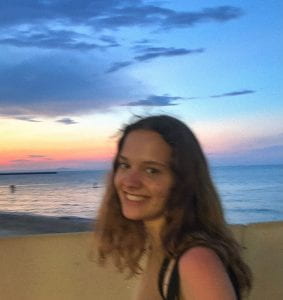
SHE/HER/HERS
Hometown: Lockport, IL
Year: 2024
Major(s): Neuroscience & History (minor)
Schools: Weinberg College of Arts and Sciences
Involvement on Campus: Supplies for Dreams (a club that mentors CPS students), NU track club
Special Interests/Hobbies: Running, reading, baking
Research Funding and Programs: I received a grant for my SURG proposal and completed my research project in summer 2021; now I’m doing research for credit through the neuroscience department!
Research Experiences: I work in the Guemez-Gamboa lab, which studies the genetic basis for different neurodevelopmental disorders. When I began working in my lab, my research was mostly focused on stem cells, but now I work more with mouse models. In lab, I frequently use PCR and other genetic sequencing tools to determine the genotypes of my lab’s mice. I have also conducted seizure susceptibility tests on the mice and studied the mice’s brains under a fluorescence microscope.
How did you get interested in research? I have wanted to participate in research since high school, but I didn’t have any research experience (or any understanding of what research involved) until I took part in SRW. Through SRW, I found a lab and learned more about how research is conducted professionally. After a few months of working in my lab, I realized how much I enjoyed doing research and I knew I wanted to continue doing it as long as possible.
How do you approach your role as a peer mentor? What is important to you about being a peer mentor? As a peer mentor, I hope to build connections with mentees from the very beginning so that they feel comfortable reaching out to me with any questions. I hope to use my own experiences to provide advice to mentees, since it was helpful to hear about my PM’s past experiences when I was first getting involved with research. Finally, I feel that it’s important to provide encouragement to mentees, since I remember being daunted by the grant-writing process and appreciating the encouragement I received from PMs during this process.
Aru (Computer Science & Neuroscience ) - Winter FLSG
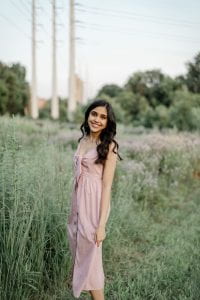
SHE/HER/HERS
Hometown: Maple Grove, MN
Year: 2024
Major(s): Computer Science and Neuroscience
Schools: McCormick School of Engineering
Involvement on Campus: Project MED (a nonprofit and NU student organization that works to diversify the healthcare workforce by organizing resources for high schoolers in underserved and underrepresented communities in medicine), Acorn Genetics (DNA sequencing startup at The Garage), Club Basketball, Was a Brewbike barista – missing Brewbike :(, Bio Lab TA
Special Interests/Hobbies: Basketball (playing and watching), eating at cool restaurants in Chicago, thrifting
Research Funding and Programs: OUR SURG (Summer 2021), NCA SIGP (Summer 2022)
Research Experiences: In my SURG experience, I worked with Dr. Mohamed Abazeed’s lab in Feinberg’s Lurie Cancer Center. Overall, the goal of my research in the Abazeed lab is to be able to distinguish between two of the phenotypes of small cell lung cancer (SCLC), adherent and suspension cells, using machine learning imaging techniques. In my summer project, I primarily worked on establishing significant differences in displacement between the two phenotypes using a computer vision technique called optical flow. By establishing this difference, we are now able to use displacement/movement as one form of information to train our machine learning algorithm on. I also have done research in the Personality and Development Lab (PAD Lab) in Northwestern’s Department of Psychology. The PADLab strives to answer questions about how youth development, personality, and multifaceted aspects of identity, such as personal values and race/ethnicity, all intersect to influence the development of psychopathologies or promote adaptive outcomes such as leadership and academic achievement.
How did you get interested in research? I first became interested in research in high school, without even really knowing what I wanted to do research in. My first project involved Natural Language Processing (NLP), a form of artificial intelligence that predicts and recognizes patterns in text. This was the first exposure I got to working with AI and machine learning and opened a world of opportunity for me. Working in the Abazeed Lab now, I’m amazed by the amount of potential machine learning has for any field, but especially for medicine.
How do you approach your role as a peer mentor? What is important to you about being a peer mentor? I am really grateful to be a peer mentor for the OUR. I think research is really special in that by finding something we are genuinely interested in learning more about and asking questions about, we can discover what truly sparks passion in us. Research has allowed me to find that passion and feel like I not only found my dream career, but I get to create it too. I think sharing that journey of learning more about what interests someone in life is incredibly special. It is important to me to create as open-minded a space as I can for my mentees, because that’s where research interests really thrive and grow. I want to be a peer mentor that empowers my peers throughout the process where they can always find support in me, but also feel like they can be confident and successful in advocating for their interests.
Austin (Biological Sciences) - SRW
HE/HIM/HIS
Hometown: Chicago, IL
Year: 2023
Major(s): Biology and Data Science (minor)
Schools: Weinberg College of Arts and Sciences
Involvement on Campus: biology students association, AMASE, Nu Karate
Special Interests/Hobbies: houseplants, aquariums, making music, cycling, reading,
Research Funding and Programs: SURG, Biolsci Resesarch Fellowship
Research Experiences: I work in a developmental biology lab at Northwestern. Here, I use frog, lamprey, and axolotl embryos to uncover how highly orchestrated regulatory pathways build a whole body plan from a single fertilized egg. I’ve utilized wet lab techniques (microinjections, in-situ hybridization, hybridization chain reaction, etc.), confocal/fluorescence microscopy, and bioinformatic pipelines in my projects. My current project involves analyzing neural crest differentiation phenotypes in tadpoles injected with a mutant form of the Sox10 gene that has been sequenced from patients with Waardenburg syndrome. My second project involves characterizing gene expression of neural crest differentiation markers.
How did you get interested in research? I always thought that pursuing a career based on investigating what we don’t know yet would be meaningful. I became fascinated with developmental/evolutionary biology through breeding fish and working at a zoo in high school, and knew that I wanted to do research in this field in college. I got started in research as a freshman through SRW!
How do you approach your role as a peer mentor? What is important to you about being a peer mentor? I strive to be open, honest, and encouraging. I will listen to your interests and help you reach them through consistent advising and careful planning!
Carina (Neuroscience) - SRW
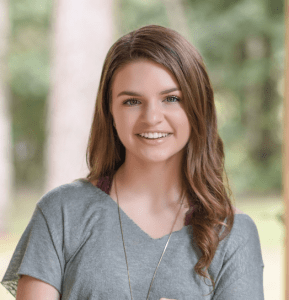
SHE/HER/HERS
Hometown: Houston, TX
Year: 2023
Major(s): Neuroscience
Schools: Weinberg College of Arts and Sciences
Involvement on Campus: Research assistant, teaching assistant for biology lab sequence and CS214, peer adviser (PA), All Ears president, former hospice patient visitor with Hospice Patient Care Club
Special Interests/Hobbies: Painting on the Lakefill and exploring coffee shops around Chicago!
Research Funding and Programs: OUR URAP, OUR SURG, OUR AYURG, DAAD RISE, Goldwater Scholarship
Research Experiences: In my URAP experience, I worked with Dr. Keith Gordon in the Human Agility Lab at Feinberg. There, I researched human movement and applications for improving physical therapy using biomedical engineering and modeling. I then conducted bioinformatic research at the intersection of immunology and genetics with the Decker Lab and Shaw Lab in Houston, TX, funded by the SURG. I am now staying with the Carvill Lab at Feinberg, where I conduct research to improve the rate of genetic diagnosis in epilepsy. I use common genetics techniques like CRISPR/Cas9 gene editing in the wet lab, and I am working to improve computational pipelines in the dry lab. I also got to conduct research in Germany last summer through DAAD RISE, focused on the epigenetics of neurodevelopment.
How did you get interested in research? I’m not really sure! I became interested in research early on in high school, well before I understood what research is really like.
How do you approach your role as a peer mentor? What is important to you about being a peer mentor? I want to be a trustworthy mentor– I want my “mentees” to trust that I am invested in helping them pursue their goals, whatever those goals may be. I think it is important to be open and approachable, especially in research– which still feels mysterious to me sometimes!
Charlotte (Social Policy & Global Health Studies) - AHSS
Hometown: Hong Kong/Los Angeles
Year: 2023
Major(s): Social Policy, Global Health Studies
Schools: SESP
Involvement on Campus: I am most involved with Students Organizing with Laboring Rights and MakeNew, a Christian Fellowship on campus.
Special Interests/Hobbies: I enjoy singing and playing the keyboard in my free time to destress. I also enjoy longboarding on campus (when it is not snowing/raining!) I also like visiting the different coffee shops in Evanston, reading or studying while sipping on a cup of oat milk latte.
Research Funding and Programs: I previously received the Summer Undergraduate Research Grant in 2021.
Research Experiences: I conducted a literature review-based research on the topic of SARS and COVID-19 in Hong Kong, focusing on the government communication and public response during these two pandemics. It largely belongs to the disciplinary field of Global Health. I conducted my research remotely in Evanston and access online press releases and news archives.
How did you get interested in research? My interest in research first sparked in my Global Health Global Bioethics Class. I was very intrigued to learn about how public health can intersect with politics and related it to my personal experience in Hong Kong. I then proceeded to talk to my professor as looked into a more specific topic within Global Health and Hong Kong I can conduct research.
How do you approach your role as a peer mentor? What is important to you about being a peer mentor? I approach my role as a peer mentor with humility and compassion. I want to be able to offer the best support I can for my peer mentee – understanding their needs and the unique challenges they each face during the quarter. I want to help them understand what topics they want to conduct research on and have the support they need and the resource to complete their research proposal. Being a peer mentor, I think it is important to me to be communicative with my peer mentees, especially since the workshop will be in a workshop format. It is also important to me gaining leadership experience, and learning how to be flexible while still able to offer accountability for my peer mentees (so they can complete their research proposal on time!).
Cyrus (Neuroscience & Global Health Studies) - SRW
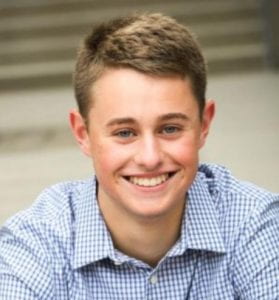
HE/HIM/HIS
Hometown: St. Louis Park, MN
Year: 2023
Major: Neuroscience
School: Weinberg College of Arts and Sciences
Involvement on Campus: I am involved with the Undergraduate Premed Society, Neuroscience Club, Club Baseball team, and am a volunteer for Books & Breakfast.
Special Interests/Hobbies: I enjoy playing and watching sports, most notably baseball. I also enjoy finding and trying new restaurants in Evanston and Chicago.
Research Funding and Programs: SURG (2020), Peer Mentor for SRW (2021), Peer Mentor for SURG (2021)
Research Experiences: I am an undergraduate researcher in the Arispe Lab at the Feinberg School of Medicine. We’re in the Department of Cell and Developmental Biology and our lab’s focus is on vascular biology. My current project in the lab focusses on the intermediate filament Vimentin and its role in endothelial cells in areas of disturbed flow.
How did you get interested in research? Going into college I knew that I wanted to be involved with research. I didn’t know that much about research though so I joined the SRW program as a freshman and it helped me not only find and join a lab but secure funding for the summer as well. I have enjoyed my research a lot and I know that it is something that I am going to continue throughout my career.
How do you approach your role as a peer mentor? What is important to you about being a peer mentor? I really like to establish what students goals’ are and work from there. Everyone has different goals and ideas about what they want to do and making sure to establish those early on helps to tailor how I help them. I think making it clear that research isn’t a straight and easy road is super important. Setbacks are inevitable whether in the process of finding a lab, getting into a lab, or in research itself and so just making sure students understand that going in is super important to me. Everyone has setbacks at some point and you shouldn’t feel bad if things aren’t going smoothly all the time.
Eleanor (Biological Sciences, Minors in Psychology and Global Health Studies) - SRW
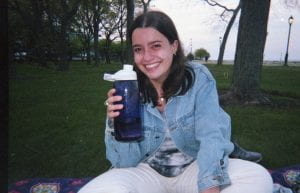
SHE/HER/HERS
Hometown: Hinsdale, IL
Year: 2023
Major(s): Biological Sciences (major), Psychology and Global Health Studies (minors)
Schools: Weinberg College of Arts and Sciences
Involvement on Campus: I am one of the Camp Kesem Outreach Coordinators, a Peer Adviser (PA), tour guide, biology lab sequence TA, and a member of Club Water Polo.
Special Interests/Hobbies: Outside of research, I love biking, baking, and coffee!
Research Funding and Programs: The last two summers I have received an Undergraduate Research Grant (SURG) through OUR. My first summer it was converted to an academic year grant (AYURG) due to pandemic activity restrictions.
Research Experience: I work in the Guemez-Gamboa Laboratory in Feinberg’s Neuroscience department. I study PACS1 syndrome which is a genetic neurodevelopmental disorder similar to Autism Spectrum disorder. We use immunofluorescence, Western Blots, and other methodology to look at how the mutated PACS1 protein affects the developing nervous system. My first year, I worked in a developmental biology lab in Evanston studying the expression of genes in Drosophila development.
How did you get interested in research? I have been interested in research since high school! I really fell in love with genetics in my biology classes and have wanted to learn more about how we can use new biotechnologies as gene therapies.
How do you approach your role as a peer mentor? What is important to you about being a peer mentor? The reason I am serving as a Peer Mentor this year is because I had such a great mentorship experience in the program my first year. I learned so much about how to ask the right kind of questions and advocate for myself. I think it is really important to realize that mentorship is a two-way street and you only can get out of it as much as you put into it. I think my mentorship style involves listening to what you have to say so that I can tailor my advice to what you are looking to get out of it using my own experiences to help give advice. I had such a great time last year with my mentees and am excited to return again!
Ella (Spanish) - AHSS
SHE/HER/HERS
Hometown: Denver, CO
Year: 2023
Major(s): Spanish major, Math minor
Schools: Weinberg College of Arts and Sciences
Involvement on Campus: WNUR Rock Show
Special Interests/Hobbies: Knitting, reading
Research Funding and Programs: URAP 2021-22, SURG 2022, Franke Fellowship 2022-23
Research Experiences: Currently I am working on my Spanish Honors Thesis researching Mexican post-revolutionary artist Isabel (Chabela) Villaseñor. I started the project with SURG this past summer and am now working on it with the guidance of the department and the Kaplan Institute. I am especially interested in her portraiture, both self- and other, as it represents femininity, race, and revolutionary politics.
How did you get interested in research? Before college, I had no idea that Spanish research was a thing. I started doing research in the Spanish department at the end of my sophomore year by asking my research professor if he needed any help, and I’ve stuck with it ever since!
How do you approach your role as a peer mentor? What is important to you about being a peer mentor? I approach my role as a peer mentor with humility. I hope that I can form relationships with other students pursuing research and be able to direct them to the proper resources. Most importantly, I hope that mentees will learn that there is no singular “right” way to approach research, and that it can look so different for so many projects. Encouraging students that their ideas can be turned into fully fledged research proposals/projects is important to me.
Emaad (Biology) - Spring FLSG
HE/HIM/HIS
Hometown: Yorba Linda, CA
Year: 2023
Major(s): Biology major, Data Science minor
Schools: Weinberg College of Arts and Sciences
Involvement on Campus: Bridge club, intramural soccer, powerlifting club
Special Interests/Hobbies: Biking, painting, watching sunsets
Research Funding and Programs: Northwestern SURG
Research Experiences: Researcher at University of California, Irvine (2018-2020) and Researcher at Feinberg School of Medicine (2020-2022)
How did you get interested in research? I was exposed to lab techniques in high school and wanted to explore the ways in which scientific knowledge is gained, so I decided to reach out to a lab at UCI. I am grateful that they took me on as a high school researcher because I was exposed to the wonders of scientific inquiry and have loved it ever since.
How do you approach your role as a peer mentor? What is important to you about being a peer mentor? A good peer mentor is not just someone who answers questions. They also provide information that mentees didn’t know to ask for. A lot of the confusion surrounding finding a lab goes with not knowing what to do or what steps to take-a peer mentor should know and explain the steps well. Being a peer mentor is important to me because when I was going through the process of finding a lab, I found it quite difficult and confusing. I want to demystify the path to becoming a researcher and help others find their love for research.
Eva (Human Communication Disorders & Psychology) - AHSS
SHE/HER/HERS
Hometown: Milwaukee, Wisconsin
Year: 2024
Major(s): Communication Studies and Psychology
Schools: School of Communication
Involvement on Campus: Northwestern University Dance Marathon, Project Sunshine, TedxNorthwestern, Tour Guide
Special Interests/Hobbies: Milwaukee Bucks, Consumer and Organizational Psychology
Research Funding and Programs: Summer Undergraduate Research Grant; Eating Disorders in Female College Students
Research Experiences: Summer Undergraduate Research Grant, Statistical Methods of Psychology Research, Psychological Research Methods
How did you get interested in research? I was interested in applying for my Undergraduate Research Grant because I had been exposed to the psychological phenomenon I was researching; thus, I was interested in how the phenomenon had impacted college students, if at all.
How do you approach your role as a peer mentor? What is important to you about being a peer mentor? I think the most important thing to me as a peer mentor is for my mentees to know that I am always available to answer any questions, read any of their progress over, or help them with any part of the proposal they may be stuck on. I want them to feel as if they can come to me with any and all issues.
Janae (Literature) - AHSS
SHE/HER/HERS
Hometown: Oak Park, IL, and Tacoma, WA
Year: 2025
Major(s): Literature
Schools: Weinberg College of Arts and Sciences
Involvement on Campus: Helicon Literary and Arts Magazine, Creative Writing Club, Chapin Residential College Exec Board, Black Mentorship Program
Special Interests/Hobbies: Watching anime, reading webtoons, writing stories, and reading #blackgirlswithmagic fantasy books.
Research Funding and Programs: SURG (2022)
Research Experiences: My SURG grant in 2022 was on the intersection of Black Speculative Fiction and Christian Fantasy. I wanted to see if there could be a book labeled as both of these genres- meaning, to have a book with the elements of a Christian Fantasy book and a Black Speculative Fiction book. I read five books on these genres and analyzed them for theme, character, word choice, plot, and setting to determine the elements that made up the Christian Fantasy and Black Speculative Fiction genres. I then wrote various literary analyses to write my findings.
How did you get interested in research? Through the various information sessions, I found that past students used research grants to work on creative projects, like novels. I saw the research grant as a perfect opportunity to pursue my dream of writing a novel.
How do you approach your role as a peer mentor? What is important to you about being a peer mentor? The most important thing to me as a peer mentor is understanding and empathy. I want my mentees to know that their ideas matter and that they can write and pursue a research grant they would like to do, despite how daunting it is.
Kaitlyn (Biology) - Spring FLSG & SRW
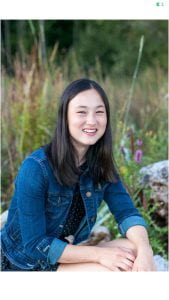
SHE/HER/HERS
Hometown: Bainbridge Island, WA
Year: 2024
Major(s): Biology, Data Science and Global Health minors
Schools: Weinberg College of Arts and Sciences
Involvement on Campus: Peer Guided Study Group Facilitator, Taekwondo, Books & Breakfast Tutor
Special Interests/Hobbies: Hiking, camping, crochet
.Research Funding and Programs: I was funded by the Peek lab to conduct research over the summer (2021) and participated in a summer research internship at the Buck Institute for Research on Aging (2022).
Research Experiences: I work in Dr. Richard Morimoto’s lab at Northwestern, where I study aging and proteostasis in C. elegans. My project investigates how cell nonautonomous signaling pathways can activate stress responses outside of the brain. Previously, I studied the role of NAD+ metabolism on ovarian aging in mice in Dr. Eric Verdin’s lab at the Buck Institute for Research on Aging, and circadian rhythm regulation of hypoxia in mouse muscle in Dr. Clara Peek’s lab at Feinberg.
How did you get interested in research? Coming out of high school, I knew I wanted to study science, but wasn’t sure what career path I wanted to pursue. At Northwestern, some of my first professors shared a bit about their research projects, and I decided to sign up for SRW to learn more about getting involved in research.
How do you approach your role as a peer mentor? What is important to you about being a peer mentor? I hope to build strong relationships with my mentees grounded in trust. As a peer, I aim to be a resource to listen and validate the mentee’s experience, and as a mentor, my goal is to help them be engaged in the world of research in the best way possible. I am excited to grow.
Kelly (Biological Sciences) - Winter FLSG
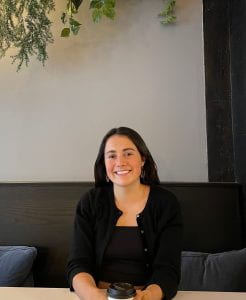
SHE/HER/HERS
Hometown: Hopkinton, MA
Year: 2025
Major(s): ): Biological Sciences (Major), Data Science (Minor), Environmental Policy and Culture (Minor)
Schools: Weinberg College of Arts and Sciences
Involvement on Campus: Biology Student Association, Cats Who Compost, Peer Advising, Community Health Corps
Special Interests/Hobbies: Soccer, traveling, and cooking!
Research Funding and Programs: I received a SURG to conduct research over the summer (2022) after participating in the 2022 SRW program.
Research Experience: I conducted research in the LaBonne Lab in the Department of Molecular Biosciences during my first year at Northwestern and completed a SURG-funded research project on campus over the summer. I worked to determine how depleting the expression of Snai1 and Snai2 transcription factors directly impacts the formation and migration of neural crest cells during embryonic development as a model for advancing our understanding of how these genes might promote cancer in adults. At the start of my freshman year, I joined the Aristilde Lab within McCormick’s Civil and Environmental Engineering Department. In this lab, I research microbial degradation of microplastics by wastewater-residing bacteria C. testosteroni using metabolomic and genomic analyses.
How did you get interested in research? I always looked up to my older cousin, who just graduated with her Ph.D. from the University of Hawaiʻi at Mānoa. I was inspired to conduct my own research as I watched her travel the world and complete a Ph.D. thesis about the spatial and temporal dynamics of SAR11 marine bacteria. As soon as I came to Northwestern, I reached out to PIs to join their lab.
How do you approach your role as a peer mentor? What is important to you about being a peer mentor? I would like to approach my role as a peer mentor as someone who feels more like a peer than a mentor. I think we can all learn from each other, and I want each of the students in the program to be comfortable with making mistakes and asking questions. I listen to what the students in my group need from me and help them develop the independence and perseverance to solve their own challenges. I am excited to be a peer mentor because I greatly valued my SRW mentorship experience during my freshman year.
Sarah (Biological & Chemical Engineering, Biological Sciences) - Winter FLSG
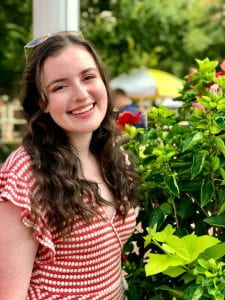
SHE/HER/HERS
Hometown: Lake Zurich, IL
Year: 2023
Major(s): Chemical & Biological Engineering, Biological Sciences (Data Science minor)
Schools: McCormick School of Engineering
Involvement on Campus: I am Vice President of the Biology Students Association (BSA), Social Director of the Society of Women Engineers (SWE), and a member of the American Institute of Chemical Engineers (AIChE)
Special Interests/Hobbies: In my free time, I like to play the piano, paint, and sing. I am also on the Interschool Board for the Chicago Area Undergraduate Research Symposium (CAURS) working to organize this year’s conference!
Research Funding and Programs: I am a 2022 Goldwater Scholarship recipient. I was also a 2021 SURG funded by the Alumnae of Northwestern and a 2020 SURG (converted to an AYURG due to the pandemic). I have also received multiple conference travel grants from the Office of Undergraduate Research to present my research.
Research Experiences: I am in Professor Michael Jewett’s lab. It is a chemical engineering lab focused on cell-free synthetic biology. I specifically research cell-free glycosylation where I focus on improving the efficiency of enzymatically attaching a sugar antigen to a protein to make vaccines against bacterial pathogens. I have also completed a research and development internship where I worked to improve a microfluidic lateral flow assay to detect HIV in blood donations.
How did you get interested in research? I first became interested in research in high school when I gravitated toward topics such as biology and chemistry. I enrolled in an introduction to research summer program after my sophomore year in high school which encouraged my interest. Upon starting at Northwestern, I attended many research seminars to hone in on my research interests.
How do you approach your role as a peer mentor? What is important to you about being a peer mentor? I make sure to establish a trusting relationship with my mentees first. This makes the rest of the process easier because they are not as afraid to come to me with questions or concerns. Also, I try to tell them that there are not set deadlines and help them set goals, but make sure they know they can be honest about if they have or have not completed something. Being a peer mentor is important to me because I greatly benefited from SRW and the guidance of my peer mentor, so I want to be that guide for others to help them achieve their research goals.
Matthew (Biology, Chemistry) - SRW
HE/HIM/HIS
Hometown: Chicago, IL
Year: 2025
Major: Chemistry (major), Biology (major)
School: Weinberg College of Arts and Sciences
Involvement on Campus: Northwestern swim club, undergraduate chemistry council
Special Interests/Hobbies: Hiking, swimming, skiing
Research Funding and Programs: 2022 SURG
Research Experiences: I have been working with the Eisenbarth-Williams Lab at Feinberg’s immunology department for the past 7 months. My research is focused on alloimmunization during blood transfusions; potentially life threatening immune reactions certain recipients make to transfused blood. I investigate the immunostimulatory components in transfused blood and their corresponding immune receptors in responding transfusion recipients.
How did you get interested in research? I have always loved learning new things, and have been interested in research ever since I learned that learning could be a profession. I also enjoy the potential to contribute knowledge to the world, making it better for future generations.
How do you approach your role as a peer mentor? What is important to you about being a peer mentor? My goal is to help guide new researchers into their first research position, as I know firsthand how new and disorienting the process can be. As a peer mentor, I aim to do this from the perspective of a peer; providing a supportive and collaborative environment where students can learn from each other as much as from me. This also means that I will aim to ensure that students can meet the goals they set for themselves by being an open resource for students to ask anything I have experience with. My own peer mentor greatly helped me navigate my own research experience, and I would like to emulate that.
2023 Summer Research Peer Mentors
Abby (Earth & Planetary Sciences, Environmental Sciences)
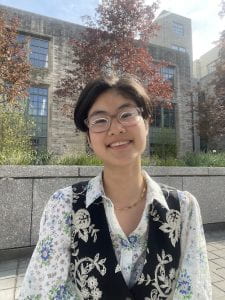
THEY/THEM
Hometown: Third Lake, IL
Year: 2023
Major(s): Earth & Planetary Sciences; Environmental Sciences
Schools: Weinberg College of Arts and Sciences
Involvement on Campus: Northwestern Undergraduate Research Journal, Hobart Residential College, student worker at Norris Student Center
Special Interests/Hobbies: Knitting, writing, bookbinding
Research Funding and Programs: SURG 2022
Research Experiences: I have been a part of Dr. Magdalena Osburn’s lab since fall 2021 studying microbial ammonia oxidation in Mammoth Cave, culminating in my senior thesis project which was focused on characterizing a number of microbial isolates capable of surviving in high-nitrogen environments in the cave. The SURG grant funded my summer spent working on isolating microbes from the cave. I have also presented my work in poster sessions at the Midwest Geobiology Symposium and the American Geophysical Union fall conference.
How did you get interested in research? I’ve always wanted to do research, but taking Dr. Osburn’s microbial ecology class in the fall of 2021 introduced me to how my interests in earth science and biology could be combined and got me interested in doing research in the microbial ecology field.
How do you approach your role as a peer mentor? What is important to you about being a peer mentor? I really want to bring my experiences with doing independent research to my approach to supporting and encouraging my mentees in their own projects. I think it’s really important to acknowledge the realities and struggles of what lab-based research in particular is like on the day-to-day level, and I hope that I’ll be able to learn from my mentees just as much as they can learn from me and that I can help them develop more self-encouragement and self-sufficiency that they can carry forward into the future.
Addison (Biological Sciences & Psychology)
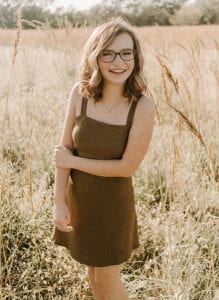
SHE/HER/HERS
Hometown: Omaha, NE
Year: 2024
Major(s): Biological Sciences & Psychology
Schools: Weinberg College of Arts and Sciences
Involvement on Campus: Peer Guided Study Group Facilitator, Active Minds Special Events Co-Chair, Kesem Counselor, Northwestern Emergency Medical Organization (NEMO), Northwestern Alzheimer’s Buddies
Special Interests/Hobbies: Ballet, reading, trying new coffee shops
Research Funding and Programs: SURG
Research Experiences: Last summer, I worked on the When to Worry study in the Department of Medical Social Sciences at Feinberg School of Medicine studying behavioral regulation in infants and maternal depression rates. This year, I am preparing to complete an honors thesis on infant behavioral regulation and physical communication between mom and baby.
How did you get interested in research? I’ve always wanted to do some sort of research, but after taking some Psychology classes, I realized that I wanted to focus on child development. Knowing this, I found a work study job with the When to Worry Lab and was hooked!
How do you approach your role as a peer mentor? What is important to you about being a peer mentor? I like to make sure my mentees know that I always want to answer their questions! Starting research can be intimidating, and I’d like to help people ease into it.
Aidan (Earth & Planetary Sciences)
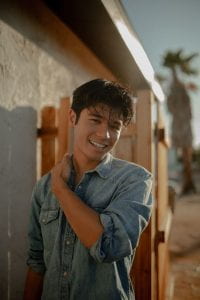
HE/HIM
Hometown: Orange County, CA
Year: 2024
Major(s): Earth and Planetary Science
Schools: Weinberg College of Arts and Sciences
Involvement on Campus: NU Kaibigan (Philippine Students Association)
Special Interests/Hobbies: Photography, outdoor activities, running
Research Funding and Programs: AGILE Research Internship, SURG, OUR, JR Academy
Research Experiences: My undergraduate research experience began in January 2022 with Dr. Shelby Hatch in the Dept. of Chemistry. As a research assistant, I studied heavy metal contamination in Chicago soils as a result of industrialization. The following summer, I completed a Summer Undergraduate Research Grant (SURG) continuing an independent project to explore the distribution of heavy metals in correlation to relevant socioeconomic and racial demographics. In February 2023, I had the opportunity to sail on Expedition 398P aboard the JOIDES Resolution, an international geoscience research vessel. During my time at sea, I gained experience in each of the vessel’s floating laboratories, explored drilling equipment, and worked with faculty mentors in developing my science communication skills. Currently, I am working on my senior honors thesis focusing on modeling the impacts of wildfires on sediment transport in debris flows occurring along the California coast.
How did you get interested in research? My initial interest in research was due to my work in Dr. Hatch’s environmental research lab. This opportunity allowed me to pursue scientific questions that explored solutions and problems in my communities. There I understood the utility of research for furthering societal change and was excited to continue along this path in research.
How do you approach your role as a peer mentor? What is important to you about being a peer mentor? I’m excited to be a part of the peer mentor program for the first time this summer! As a peer mentor, I look forward to supporting students from a variety of academic backgrounds who have varying amounts of research experience. Since I am also early in my research career, I understand the importance of peer support and mentorship hope to have a positive impact on my mentees’ summer research experiences and beyond!
Anastasia (Ziyi) (Physics & Astronomy & Data Science)
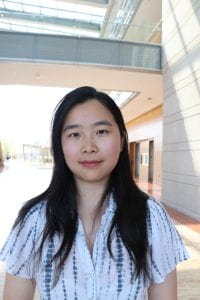
SHE/HER/HERS
Hometown: Wuhan, China
Year: 2025
Major(s): Physics & Astronomy, Data Science
School: Weinberg College of Arts and Sciences
Involvement on Campus:Willard Residential College, Society of Physics Students (SPS), We’re in Physics (WiP), Dearborn Observatory, Center for Interdisciplinary Research and Exploration (CIERA)
Special Interests/Hobbies: Playing guitar, reading, going on walks, petting cats
Research Funding and Programs: SURG 2022
Research Experiences: I joined the Miller research group at CIERA winter of my first year. Since then, I’ve been working in the field of observational astronomy with large time domain astronomy surveys, specifically the Bright Transient Survey (BTS) conducted by the Zwicky Transient Facility. Most of my research focuses on understanding the formation channels and physics of Type Ia supernovae. I spend a lot of time coding, debugging, looking at light curves, and model fitting.
How did you get interested in research? During my junior year summer, I had the opportunity to participate in Yale’s Summer Program in Astrophysics. Alongside three other passionate high school students from different parts of the country, we observed and classified a nearby bright supernova. This experience was not only enjoyable but also incredibly enlightening. It was during this project that I discovered my fascination for astronomy and realized the potential for a future career in research.
How do you approach your role as a peer mentor? What is important to you about being a peer mentor? As a peer mentor, I approach my role with a focus on supporting and guiding my mentees through their first experience of conducting independent research. I understand how intimidating it can be, particularly when faced with open-ended questions and the absence of a set schedule or timeline. I personally remember the constant worry about making progress and feeling uncertain. Therefore, I prioritize providing my mentees with the necessary support and encouragement to develop confidence and become independent researchers. I strongly believe in the value of open communication in mentorship. While dedicating time to research is crucial, I also emphasize the significance of building relationships with fellow researchers and research mentors.
Anya (Neuroscience)
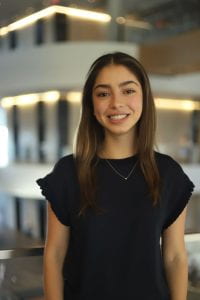
SHE/HER/HERS
Hometown: Westchester, NY
Year: 2025
Major(s): Neuroscience
School: Weinberg College of Arts and Sciences
Involvement on Campus: NU club tennis, Wildcat Welcome Peer Advisor, Physicians for Human Rights & Community Health Corps
Special Interests/Hobbies: Cooking, barre, reading.
Research Funding and Programs: I received the SURG the summer after my freshman year. Since then I have engaged in the Neuroscience 399 program and am continuing to do research this upcoming summer.
Research Experiences: Last summer, I worked for the Department of Medical Social Sciences at Feinberg School of Medicine on the When to Worry study, researching the intersection of infant behavioral regulation and levels of family conflict. I worked at home during the summer, as I could do my research remotely. This past fall, I transitioned to working in the Allada Lab on campus. Now, I study the mechanism of homeostatic sleep drive and the localization of the neurons involved in Drosophila sleep.
How did you get interested in research? I have been interested in doing research since high school, but did not have the opportunity to do so until coming here! I became super interested in developmental psychology when taking the class at Northwestern, which led me to my first research experience. I later decided to pivot to wet lab research, at which point I began work at my current lab!
How do you approach your role as a peer mentor? What is important to you about being a peer mentor? I had a wonderful experience with my peer mentor last summer who was really able to help me develop a plan for staying organized and on top of my remote research internship. I hope to form meaningful connections with my group and create a space where we can all learn from one another and cheer each other on.
Aspen (Neuroscience)
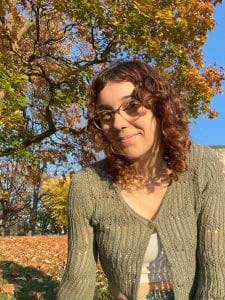
SHE/HER/HERS
Hometown: Fairfax, VA
Year: 2024
Major(s): Neuroscience
School: Weinberg College of Arts and Sciences
Involvement on Campus: NEURON
Special Interests/Hobbies: Painting/Crocheting, running, cooking, watching old movies
Research Funding and Programs: AYURG, WCAS AYURG, SURG, Advanced SURG, NERUON
Research Experiences: I have been involved in research in the Redei lab in Feinberg since my freshman year. I study behavioral science and psychiatry in rodent models and how stress alters behavior as well as hormonal regulation. I have been to three conferences to present my work and am currently writing my first manuscript. I’m excited to continue on with a new project this summer about aggression through development and begin my senior thesis.
How did you get interested in research? Part of me has always been interested in research, but about a month into my time in the Redei lab I watched one of the upperclassmen undergraduates finally collect and analyze data after completing her behavioral paradigm and I absolutely fell in love with the process of active learning.
How do you approach your role as a peer mentor? What is important to you about being a peer mentor? What’s most important to me is that the SURG recipients are able to use this summer to extend their research experience into the field. I want to be able to show them that even though the day-to-day life of research can be frustratingly slow, or set-backs can seem overwhelming, the end product is well worth it. As a mentor I will be able to create a space for people to get their frustrations out in a safe space, and give feedback as to how to approach overcoming any obstacle so that at the end of the summer the students will have a result they are proud of (and maybe even want to continue!)
Bobby (Comparative Literary Studies & Economics)
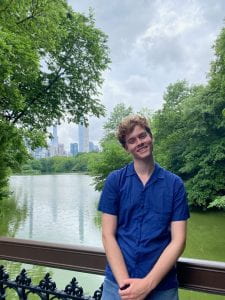
HE/HIM
Hometown: Scottsdale, AZ
Year: 2024
Major(s): Comparative Literary Studies and Economics
School: Weinberg College of Arts and Sciences
Involvement on Campus: Block Museum of Art, NUCHR, Comp Lit SAB Rep
Special Interests/Hobbies: Visiting art museums, reading, hiking, playing with dogs
Research Funding and Programs: URAP (2021), Leopold Fellowship (2022-present), SURG (2023)
Research Experiences: My first research experience was as an assistant working with a professor on his book project all about the literature of steamships and ports as sites of exchange in the early-mid 20th century. My work focused on literary and artistic representations of Marseille, and I was finally able to put French to use outside the classroom by working on translations for the project. Through the Leopold program, I’ve carried out some archival research to look into key figures in the International Military Tribunal at Nuremberg. For my independent project this summer, which will inform my comp lit thesis, I’ll be in Tangier, studying how the ongoing process of decolonization has shaped (and been shaped by) literary encounters between Moroccan and non-Moroccan writers since the 1960s in this port city.
How did you get interested in research?The Kaplan scholars program sparked my interest in the interdisciplinary possibilities of humanities research during my freshman year. My first faculty mentor encouraged me to lean into the complex, often frustrating process of building out a project, and seeing my past projects in the rearview mirror has been really fulfilling, knowing how they’ve shaped my long-term values and goals.
How do you approach your role as a peer mentor? What is important to you about being a peer mentor? It’s important that there’s no hierarchy between me and my “mentees”. I’ll be working through my own project alongside them, so I’m approaching the role with excitement to learn about what they’re doing and to share insights and advice in two-sided conversations. I hope I’ll be a useful sounding board for talking through difficult knots in the research process – it’ll be cool to find similarities or overlap in research, even with projects that, on paper, have nothing in common with mine.
Camila (Political Science & Philosophy)
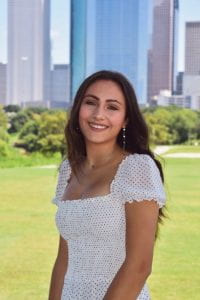
SHE/HER
Hometown: Houston, TX
Year: 2024
Major: Political Science & Philosophy
School: Weinberg College of Arts & Sciences
Involvement on Campus: Undergraduate Writing Center Consultant, Kappa Alpha Theta Member, BridgeNU President
Special Interests/Hobbies: Running, hiking, climbing, and the outdoors in general
Research Funding and Programs: Farrell Fellowship in Political Science, SURG
Research Experiences: SURG in Philosophy on Marxian Morality, Farrell Fellow in Political Science with the Chicago Democracy Project under Professor Jaime Dominguez, Honors Thesis in Political Science: Understanding Venezuelan Political Participation in the United States, Honors Thesis in Philosophy: Defensive Medicine as an Ethical Issue
How did you get interested in research? I got a SURG grant my Freshman year and ever since then, I have spent my academic career pursuing more research as I find it a great way to develop research and writing skills. I have pursued very diverse research projects but am now focusing on the completion of my honors theses in latino politics and applied philosophy.
How do you approach your role as a peer mentor? What is important to you about being a peer mentor? I hope to approach my role as a peer mentor with the same passion for helping students and myself become better researchers and writers as I do throughout the school year at the Undergraduate Writing Center. Working with peers on their research and writing has been instrumental in my development as a researcher and I hope to give my mentees the same support that working with others has provided me. I hope to continue to grow my skills and learn new ones as I work with students in different disciplines this coming summer.
Divya (Journalism, Psychology, Data Science)
SHE/HER/HERS
Hometown: Cleveland, OH
Year: 2025
Major(s): Journalism, Data Science, Psychology
Schools: Medill
Involvement on Campus: Body and Media Lab, The Daily Northwestern, All Paws In
Special Interests/Hobbies: Reading, Baking, Traveling
Research Funding and Programs: Summer Undergraduate Research Grant, Benton J. Underwood Summer Research Fellowship
Research Experiences: Research Assistant in the Body & Media Lab under Dr. Renee Engeln; Summer Undergraduate Research Grant in 2022 to investigate a local tourism board’s use of public funds for influencer marketing
How did you get interested in research? Both in high school and in college, I’ve seen research as an opportunity to get hands-on experience and delve deeper into what interests me in the classroom. I’ve found opportunities to explore my various research interests by pitching my own projects and joining a lab that aligns with one of my key areas of focus.
How do you approach your role as a peer mentor? What is important to you about being a peer mentor? I hope to support my mentees as they navigate their projects by providing guidance, encouragement, and assistance. Working on an independent study can be challenging (and there is no one-size-fits-all approach), so I hope we can learn from one another and form meaningful connections as we determine the best way to work through challenges — and celebrate successes. I have benefited immensely from the help of my research mentors, and I welcome the opportunity to pay it forward.
Elizabeth (Art History)
Coming soon!
Erica (Neuroscience)
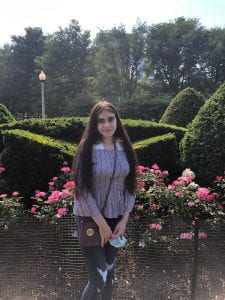
SHE/HER/HERS
Hometown: Gurnee, IL
Year: 2024
Major(s): Neuroscience
School: Weinberg College of Arts and Sciences
Involvement on Campus: Destino, Bienestar: Latinx Service Club, Alianza: The Latinx Student Alliance, Arch Scholars Mentor
Special Interests/Hobbies: Bible study, drawing and painting, horseback riding, reading
Research Funding and Programs: I joined Reza Vafabakhsh’s lab in the summer of 2021 during the Posner Research Program here at Northwestern. I then was awarded a SURG last summer to continue my research in the Reza lab. I will be a part of the UCLA Biosciences Scholars Program for this upcoming summer to work in Stephanie Correa’s lab
Research Experiences: I joined the Reza lab the summer after freshman year and have worked on multiple projects during my time there. The first involved mapping the phosphorylation sites on the c-terminus tail of mGluR2. mGluR2 is a GPCR found in the brain which is activated by glutamate and has been found to be involved in neurological disorders such as depression and schizophrenia. I also worked to explore other post-translational modifications for other key GPCRs like mGluR3. Additional projects included developing methods for detecting and characterizing GPCR heterodimers in vivo and investigating the mechanisms of activation for GPR110 and GPR114. I then started this spring quarter in Tiffany Schmidt’s lab which focuses on studying the role of intrinsically photosensitive retinal ganglion cells (ipRGCs) in non-image forming visual behaviors like photoentrainment of the circadian rhythm of an organism. My project focuses on studying the neuronal circuit that involves ipRGCs to control the estrus cycle in mice, and also how estrogen can affect the ipRGCs of the retina.
How did you get interested in research? I came into Northwestern undecided but just knew that I loved science. Because of that I wanted to try out research which is why I participated in the Posner Program and instantly fell in love with research and being in the lab. Since then I decided I will pursue a PhD after Northwestern in order to continue my love for research and what it holds.
How do you approach your role as a peer mentor? What is important to you about being a peer mentor? In my journey through research I have had many mentors help me along the way, especially since as a first gen student this was all so new to me. Having that guidance along the way was so crucial to allow me to value the constant setbacks in research and be confident in my abilities as a researcher. Because of that, I would love to share all the knowledge I have gained along the way and hope that it will be of use to those who may be in similar situations as I was. Science cannot grow without collaboration, and I think mentorship is one of the ways where creativity in how research is approached can be fostered. It’s exciting for me to know that I can take part in this and encourage others to give research a chance.
Esther (Neuroscience & Psychology)
Coming soon!
Ferdinand (Theatre)
Coming soon!
Hein (Computer Science)
SHE/HER
Hometown: Boise, ID
Year: 2025
Major(s): Computer Science
Schools: Weinberg College of Arts and Sciences
Involvement on Campus: ASLA Drop-in Math Tutor, PIE Facilitator
Special Interests/Hobbies: Weightlifting, martial arts, hiking
Research Funding and Programs: SURG 2022, Simons Foundation SCGB Fellow
Research Experiences: I worked in the Klein Lab for a year investigating amyloid-beta oligomers, which have been closely linked to Alzheimer’s disease pathology. The SURG grant funded a group project that seeked to understand what factors influenced the formation of amyloid-beta oligomers and their toxicity. I also worked in the Pinto Lab as a Simons Fellow in the SCGB program. My project involved understanding how neuronal subtypes in the prefrontal cortex facilitate flexible decision-making, and I presented my work at the SCGB Poster Symposium in NYC.
How did you get interested in research? In high school, I heard from some of my teachers that doing research in a specific discipline really allowed you to apply what you learn in the classroom to more tangible work. Intrigued, I worked in a microbiology lab in the summer before college. The experience fostered my interest in research as it challenged me to become a more critical thinker and meticulous worker.
How do you approach your role as a peer mentor? What is important to you about being a peer mentor? As a mentor, I want to reflect on my research experiences as a whole and be able to lend mentees support and guidance with an open mind. It’s important that I listen closely to, validate, and encourage my mentees throughout their own research journey. Everyone’s personal experience in research looks different, so there is always something new for mentors to learn from their mentees.
Isabel (American Studies)
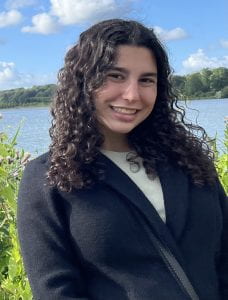
SHE/HER/HERS
Hometown: New York City, NY
Year: 2024
Major(s): American Studies
School: Weinberg College of Arts and Sciences
Involvement on Campus: NUMUN, American Studies SAB, DSP
Special Interests/Hobbies: Travel, listening to music / going to concerts, writing
Research Funding and Programs: SURG 2021
Research Experiences:I conducted an independent research project through a SURG in NYC’s Riverside Park, using interviews, fieldwork, and readings to strategize how to preserve and improve the park for future generations. I will write a senior thesis in American Studies with the working title “Myths, Realities, and Revitalization Strategies of the Midwestern Main Street.”
How did you get interested in research? When COVID canceled the end of my senior year of high school, I had a lot of free time to read and explore my interests. I discovered my interest in urban studies during this time, and I came to Northwestern wanting to conduct independent research in the field. Through the AHSS workshop, I learned how to turn my interests into a cohesive project and how to convey my ideas in a grant application, which led to my SURG project after my first year. Since then, I’ve been preparing for my senior thesis through my coursework and independent study.
How do you approach your role as a peer mentor? What is important to you about being a peer mentor? I think that the peer and mentor parts of the role are equally important. Having done a SURG, I have advice to give and am happy to answer any questions my mentees have. I also know that independent research can feel isolating, so I want to be someone my mentees can talk to. Being responsive is my top priority. I want to help however I can!
Jake (Biological Sciences)
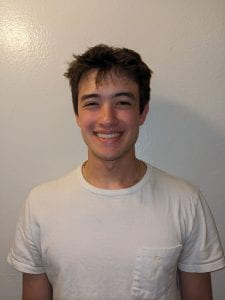
HE/HIM
Hometown: Chicago, IL
Year: 2024
Major(s): Biological Sciences
Schools: Weinberg College of Arts and Sciences
Involvement on Campus: Member of club baseball and tutor in NU Heights
Special Interests/Hobbies: Lifting weights, running, and cooking
Research Funding and Programs: SURG (2022), Weinberg Baker Grant (2023)
Research Experiences: My research experience has been exclusively through the Pinkett Lab in the department of Molecular Biosciences at Northwestern. I have been enrolled in research for credit every quarter since the winter of 2022. During the summer of 2022 I received the SURG to continue the research that I had started during the school year. This summer, I plan to continue my research through the financial help of the Baker Grant. The Pinkett Lab studies the structure and function of ABC transporters using a variety of different biochemical techniques. When I joined the lab, another undergraduate researcher and I were assigned different domains within a specific ABC transporter known as ProU. Our final goal is to develop an understanding of the transporter’s structure and function, but much of the project up to this point has been trouble shooting the purification protocol to ensure the protein is as stable as possible.
How did you get interested in research?: In both high school and college, I had heard the term research being used frequently in reference to jobs in the sciences but had no real conception of what research actually entailed. Coming into college I knew I wanted to gain some exposure to the field and see if it was something I enjoyed.
How do you approach your role as a peer mentor? What is important to you about being a peer mentor?: I hope that as a peer mentor I am able to provide a space that celebrates successes in the research process, and redefines “failures” as essential steps on the way to success. I was lucky enough to be paired with another undergraduate in the lab, so I understand how helpful it is to be able to talk with a peer about the research process. It’s important to me that I provide others with the same type of support that I received from peers during my research process.
Janae (English Literature)
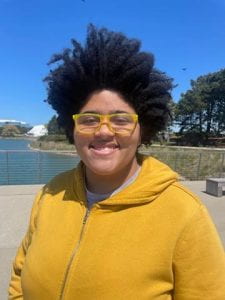
SHE/HER/HERS
Hometown: Oak Park, IL, and Tacoma, WA
Year: 2025
Major(s): Literature
Schools: Weinberg College of Arts and Sciences
Involvement on Campus: Helicon Literary and Arts Magazine, Creative Writing Club, Chapin Residential College Exec Board, Black Mentorship Program
Special Interests/Hobbies: Watching anime, reading webtoons, writing stories, and reading #blackgirlswithmagic fantasy books.
Research Funding and Programs: SURG (2022)
Research Experiences: My SURG grant in 2022 was on the intersection of Black Speculative Fiction and Christian Fantasy. I wanted to see if there could be a book labeled as both of these genres- meaning, to have a book with the elements of a Christian Fantasy book and a Black Speculative Fiction book. I read five books on these genres and analyzed them for theme, character, word choice, plot, and setting to determine the elements that made up the Christian Fantasy and Black Speculative Fiction genres. I then wrote various literary analyses to write my findings.
How did you get interested in research? Through the various information sessions, I found that past students used research grants to work on creative projects, like novels. I saw the research grant as a perfect opportunity to pursue my dream of writing a novel.
How do you approach your role as a peer mentor? What is important to you about being a peer mentor? The most important thing to me as a peer mentor is understanding and empathy. I want my mentees to know that their ideas matter and that they can write and pursue a research grant they would like to do, despite how daunting it is.
Jerry (Mechanial Engineering)
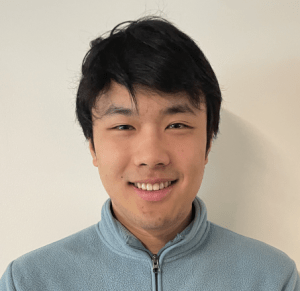
HE/HIM/HIS
Hometown: Pleasanton, CA
Year: 2025
Major(s): Mechanical Engineering
Schools: McCormick School of Engineering
Involvement on Campus: NU Solar Car Team, NU Club Badminton, Ford Design Shop
Special Interests/Hobbies: Playing musical instruments, Sci-fi books, ultimate frisbee
Research Funding and Programs: I started working in Professor Sinan Keten’s research lab during winter of my freshman year, then I proceeded to do a summer research project in his lab under the SURG grant, and I have been continuing in his lab ever since.
Research Experiences: I have been part of 2 research projects in Professor Keten’s lab, both using molecular dynamic simulation techniques to investigate polymer-composite materials. In the first project, which is my SURG project, I investigated the mechanical and structural properties of polymer-grafted-nanoparticles (PGN). The second project, which I am part of right now, is focused on learning about segmental dynamics of coarse-grained polymer chains grafted onto nanoparticle surfaces.
How did you get interested in research? I became interested in research through a couple of faculty presentations where they briefly talked about what they were working on and the implications of their work. My first quarter at Northwestern saw me exposed to many research topics, so I became interested in different topics in research this way.
How do you approach your role as a peer mentor? What is important to you about being a peer mentor? I would like to learn from my peer mentor last year and be a good facilitator between the students and the administrators. I would like to pass down the information others gave me and those I learned myself, sometimes in a hard way, so that they do not have to go through some of the same troubles I did. I also think it is important to facilitate conversation between the research award winners.
Joy (Music Cognition & Psychology)
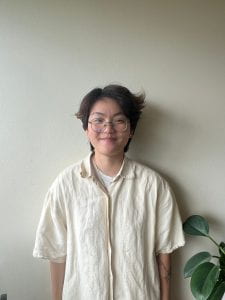
HE/HIM; SHE/HER
Hometown: San Jose, CA & Taipei, Taiwan
Year: 2024
Major(s): Dual Degree Music Cognition & Psychology
Schools: Bienen School of Music, Weinberg College of Arts and Sciences
Involvement on Campus: Students Organizing for Labor Rights (SOLR), Academy of Music and Arts for Special Education (AMASE). I also work at SESP’s Center for Talent Development as a clerical aid.
Special Interests/Hobbies: Making/listening to music, cooking
Research Funding and Programs: SURG (2022), URAP (2022), WCAS Grant (2023)
Research Experiences: For my SURG project, I investigated how harmonic progressions in K-Pop subvert or confirm our musical expectations. I organized 200+ K-Pop harmonic progressions patterns from the top 100 pop charts (Billboard and Melona) into a formal generative model based on my Roman Numeral analysis. The compiled data was then ran through the Music21 ToolKit to extract, confirm and compile chord progression pathways. I generated original Python codes in Music21 to identify specific progressions that confirm or subvert our typical musical expectations. I was also a research assistant for Dr. Richard Ashley’s URAP project on disparate musical comprehension experiences between everyday-listeners and musicians. We used the Music21 Toolkit to program a single formal model to predict and quantify such disparities. We also analyzed musical scores in terms of form, harmonic progression, melodic structure, and interaction with musical expectations.
How did you get interested in research? I’ve always been interested in research and examining the intersections between my myriad interests. I began my first in depth research project after taking Dr. Ashley’s music cognition classes, and started incorporating my own interests and background to my studies.
How do you approach your role as a peer mentor? What is important to you about being a peer mentor? Conducting your own independent research for the first time can be incredibly daunting, so I hope to be an approachable, reliable, and comforting source of support for students who are embarking on their research journey for the first time! Research is difficult, time-consuming, and overwhelming at times so being able to lead and build a strong community as a peer mentor that can provide unique perspectives, guidance, and emotional support will be my main objective!
Julz (RTVF & Anthropology)

THEY/THEM
Hometown: Chatham, NJ
Year: 2024
Major(s): Radio/Television/Film and Anthropology
Schools: School of Communication
Special Interests/Hobbies: Screenwriting/filmmaking, Dungeons & Dragons, soccer, surfing, weightlifting, rooting for the Mets
Research Funding and Programs: SURG 2022, Studio22 $1500 Winter Grant 2023
Research Experiences: Writing and directing short films focusing on the representation of LGBTQIA+ people specifically in high-genre media.
How did you get interested in research? I became interested in research as a filmmaker because I find it incredibly important to accurately reflect the experiences of the communities one is portraying on screen. As a genderqueer person myself, I was frustrated with how transgender characters are shown in media as either the butt of a joke or, as in science fiction, unnatural, inhuman creatures, aliens, or robots. The dehumanization of LGBTQIA+ people in science fiction, fantasy, and other high-genre films, television, novels, etc. is the focus of the majority of my research and what I attempt to combat and subvert in my creative work.
How do you approach your role as a peer mentor? What is important to you about being a peer mentor? I approach my role as a peer mentor with total transparency and kindness; I hope to inspire my mentees as well as make them feel that I am always available to provide aid in whatever way I can. I am extremely experienced in all areas of media production, from development to shooting to post-production in multiple different departments. I am also well-versed in respectful anthropological methods of ethnography at the center of effective research practices. What is most important to me about being a peer mentor is communication and emphasis on the knowledge that even if I do not have an immediate answer, I will dedicate myself to helping the mentee find the solution they need.
Kate (Neuroscience)
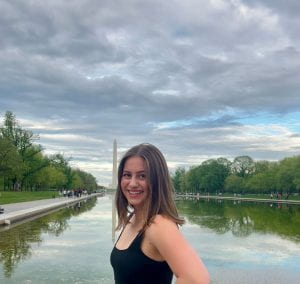
SHE/HER/HERS
Hometown: Granite Bay, CA
Year: 2025
Major(s): Neuroscience
School: Weinberg College of Arts and Sciences
Involvement on Campus: I am the Meet Director for Swim Club, a Peer Advisor (PA), a Chemistry and Biology Tutor for ASLA, and a member of the Sailing Club.
Special Interests/Hobbies: Swimming, hiking, Mario Kart
Research Funding and Programs: I received a SURG last summer (2022) from OUR. I received an AYURG for the same project this winter (2023) and the SURG Advanced for this summer (2023). I was an Oral Presenter at the 2023 Chicago Area Undergraduate Research Symposium, which is one of the largest undergraduate research conferences in the country. I was also an Oral Presenter at the 2023 OUR Expo.
Research Experiences: Since March 2022, I have worked in the Perera Lab at the Feinberg School of Medicine. We study pharmacogenomics, which is how to predict an individual’s response to a drug from their genetics. I spent 1 year doing computational work to identify novel genetic variants and DNA methylation sites associated with the activity of drug-metabolizing enzymes. I am now doing a wet lab project to identify how altering certain variants causes changes in DNA methylation, gene expression, and drug metabolism.
How did you get interested in research? Research is something I’ve always wanted to get involved in. Coming to Northwestern, I was interested in doing basic genetics research. However, I also wanted experience in a field with direct clinical applications. I found that precision medicine research is the perfect balance between these two interests.
How do you approach your role as a peer mentor? What is important to you about being a peer mentor? I see being a peer mentor as a two-way street – I want to learn as much from my mentees as they learn from me. Though I have significantly grown as a scientist in the past year, there are so many things I still want to learn. I hope to be a valuable resource for my mentees as they plan and troubleshoot their projects; however, I also hope they are excited to teach me about their research. I believe this will make being a peer mentor a fulfilling and valuable experience for both of us. I also hope to help my mentees find passion and purpose in their research. Though the research process is incredibly rewarding, it can also be frustrating. Staying connected to the purpose of your research is critical for your success and enjoyment of your work. I hope that by the end of the summer, all of my students will have found a greater sense of meaning in their work.
Kelly (Biological Sciences)

SHE/HER/HERS
Hometown: Hopkinton, MA
Year: 2025
Major(s): ): Biological Sciences (Major), Data Science (Minor), Environmental Policy and Culture (Minor)
Schools: Weinberg College of Arts and Sciences
Involvement on Campus: Biology Student Association, Cats Who Compost, Peer Advising, Community Health Corps
Special Interests/Hobbies: Soccer, traveling, and cooking!
Research Funding and Programs: I received a SURG to conduct research over the summer (2022) after participating in the 2022 SRW program.
Research Experience: I conducted research in the LaBonne Lab in the Department of Molecular Biosciences during my first year at Northwestern and completed a SURG-funded research project on campus over the summer. I worked to determine how depleting the expression of Snai1 and Snai2 transcription factors directly impacts the formation and migration of neural crest cells during embryonic development as a model for advancing our understanding of how these genes might promote cancer in adults. At the start of my freshman year, I joined the Aristilde Lab within McCormick’s Civil and Environmental Engineering Department. In this lab, I research microbial degradation of microplastics by wastewater-residing bacteria C. testosteroni using metabolomic and genomic analyses.
How did you get interested in research? I always looked up to my older cousin, who just graduated with her Ph.D. from the University of Hawaiʻi at Mānoa. I was inspired to conduct my own research as I watched her travel the world and complete a Ph.D. thesis about the spatial and temporal dynamics of SAR11 marine bacteria. As soon as I came to Northwestern, I reached out to PIs to join their lab.
How do you approach your role as a peer mentor? What is important to you about being a peer mentor? I would like to approach my role as a peer mentor as someone who feels more like a peer than a mentor. I think we can all learn from each other, and I want each of the students in the program to be comfortable with making mistakes and asking questions. I listen to what the students in my group need from me and help them develop the independence and perseverance to solve their own challenges. I am excited to be a peer mentor because I greatly valued my SRW mentorship experience during my freshman year.
Lucia (Journalism)
ANY PRONOUNS
Hometown: Berkeley, CA
Year: 2025
Major(s): Journalism
School: Medill
Involvement on Campus: WNUR, The Daily Northwestern
Special Interests/Hobbies: Biking, hiking, cooking, playing the guitar
Research Funding and Programs: SURG (2022), Leopold Fellowship (2023-2024)
Research Experiences: I received a Summer Undergraduate Research Grant to report and produce a three-part narrative podcast series following a 23-year-old running for Illinois State House in Palatine, IL. That project, which lasted through November, interrogated the impact of Gen-Z politicians on grassroots organizing and local politics. My upcoming research will include analyzing articles from alternative Mexican newspapers, particularly El Proceso, from the 1970s through today.
How did you get interested in research? Last year, I was searching for a way to pursue a long-time passion project while getting paid; SURG was the perfect solution. That experience taught me time management and independence I might not have found otherwise. Working on social science research has been a great way to explore my disciplines of interest outside of the classroom and has helped me developed a strong sense of purpose.
How do you approach your role as a peer mentor? What is important to you about being a peer mentor? I hope to use my experience last summer to give my mentees the resources and support they need to stay on track on their project. Research, especially independent or self-guided projects, can be daunting. I hope to help foster the self-sufficiency and confidence for all of my mentees to complete their projects and feel content with their work and their future ability to pursue research opportunities.
Maggie (Theatre & Comparative Literature)
Coming soon!
Matthew (Chemistry & Biology)
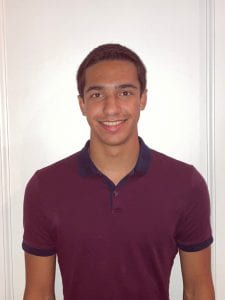
HE/HIM/HIS
Hometown: Chicago, IL
Year: 2025
Major: Chemistry (major), Biology (major)
School: Weinberg College of Arts and Sciences
Involvement on Campus: Northwestern swim club, undergraduate chemistry council
Special Interests/Hobbies: Hiking, swimming, skiing
Research Funding and Programs: 2022 SURG
Research Experiences: I have been working with the Eisenbarth-Williams Lab at Feinberg’s immunology department for the past 7 months. My research is focused on alloimmunization during blood transfusions; potentially life threatening immune reactions certain recipients make to transfused blood. I investigate the immunostimulatory components in transfused blood and their corresponding immune receptors in responding transfusion recipients.
How did you get interested in research? I have always loved learning new things, and have been interested in research ever since I learned that learning could be a profession. I also enjoy the potential to contribute knowledge to the world, making it better for future generations.
How do you approach your role as a peer mentor? What is important to you about being a peer mentor? My goal is to help guide new researchers into their first research position, as I know firsthand how new and disorienting the process can be. As a peer mentor, I aim to do this from the perspective of a peer; providing a supportive and collaborative environment where students can learn from each other as much as from me. This also means that I will aim to ensure that students can meet the goals they set for themselves by being an open resource for students to ask anything I have experience with. My own peer mentor greatly helped me navigate my own research experience, and I would like to emulate that.
Morgan (Psychology & Gender & Sexuality Studies)
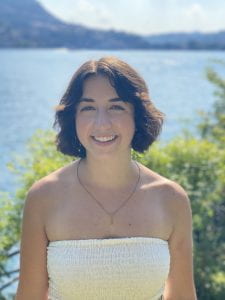
SHE/THEY
Hometown: Hingham, MA
Year: 2025
Major: Psychology, Gender & Sexuality Studies
School: Weinberg College of Arts and Sciences
Involvement on Campus: Northwestern Undergraduate Research Journal, Student Theatre, Undergraduate Psychology Association
Special Interests/Hobbies: Painting, writing, & collecting cool rings!
Research Funding and Programs: Summer Undergraduate Research Grant (2022); Leopold Fellowship (2022-2023); Conference Travel Grant (2023)
Research Experiences: Last summer I earned a Summer Undergraduate Research Grant to study transgender and non-binary student’s definitions of ‘having sex.’ Currently, I am a Leopold fellow working with Professor Lauren Stokes on their book on the history of bisexuality
How did you get interested in research? Upon learning about how populations such as the LGBTQ+ community have been excluded or mistreated/pathologized by academic research, I’ve been very interested in conducting research grounded in underrepresented stories.
How do you approach your role as a peer mentor? What is important to you about being a peer mentor? I approach my role as a peer mentor knowing how independent undergraduate research can be so exciting, unlocking interests and passions you didn’t even know you had, but also can be lonely, confusing, and very daunting. I really appreciated having someone to turn to in those moments last year, and it is very important to me that everyone conducting research at Northwestern knows that they have someone with whom they can work through these challenges, and that they don’t have to face it alone.
Olivia (Musicology)
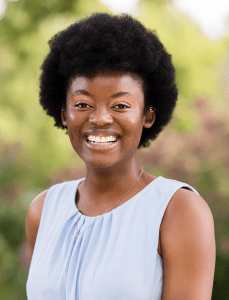
SHE/HER & THEY/THEM
Hometown: Eden Prairie, MN
Year: 2024
Major: Musicology
School: Bienen School of Music
Involvement on Campus: I work at the Office of Religious & Spiritual Life on campus and engage in community service as a member of Delta Sigma Theta Sorority, Inc.
Special Interests/Hobbies: In my free time, I love to journal, take care of my plants, and play guitar out on the lakefill.
Research Funding and Programs: Inaugural Emerging Scholars Program (2021-2022), Creative Arts Festival (2022), Research Exposition (2022), & Summer Undergraduate Research Grant (2023)
Research Experiences: I worked as a research assistant to Dr. Joshua Takano-Chambers-Letson (JCL) through the Emerging Scholars Program, where we conducted archival and qualitative analysis centering Queer-of-Color Theory in Performance Studies. This work helped me develop my own research project highlighting Black female composers in Classical music. My SURG project is rooted in addressing the cultural appropriation of Black and African Music in pop music.
How did you get interested in research? I got interested in research through working with JCL. Their research approach was rooted in the understanding that every experience could offer new insight and information. We went to museums, visited sculptures, and even flew to New York City as part of our work. This allowed me to explore performance research in a very engaging and fulfilling way.
How do you approach your role as a peer mentor? What is important to you about being a peer mentor? I would like to dismantle academic hierarchies through my role as a peer mentor. There are so many resources available specifically for students interested in music, however access to them can be limited. It’s important to me that each of my mentees is aware of these resources and feels empowered to engage with them in order to bring their creative visions to life.
Peggy (Neuroscience & Economics)
SHE/HER
Hometown: Beijing, China & Bethesda, MD
Year: 2024
Major: Neuroscience & Economics
School: Weinberg College of Arts & Sciences
Involvement on Campus: Drop-in tutoring, ISBE Arch
Special Interests/Hobbies: Cooking, baking, puzzle games
Research Funding and Programs: SURG 2022
Research Experiences: I work in a BME lab focusing on the development of biosensors. Last summer, I had the opportunity to work on a research project aimed at developing a transistor biosensor that utilizes a functionalized conducting polymer as the channel material. The goal of the project was to create a biosensor device that can detect and measure the concentration of a target analyte in a reaction. I continued to work on this project through the 2022-2023 academic year.
How did you get interested in research? I am interested in research related to biosensors and conducting polymers due to their potential impact on healthcare. In particular, the development of biosensors that can detect and measure specific analytes with high sensitivity and accuracy has the potential to revolutionize diagnostics and disease monitoring. The specific biosensor I am aiming to fabricate would be able to detect the change in glutamate levels. Shifts in glutamate levels are often associated with neurological diseases such as Parkinson’s disease and Alzheimer’s disease.
How do you approach your role as a peer mentor? What is important to you about being a peer mentor? As a peer mentor, I believe that it is crucial to create a safe and welcoming space for students to share their experiences, struggles, and achievements in their research experience. I understand that conducting research can be a challenging and complex process, and I strive to be a dependable and supportive resource for students who may feel overwhelmed or uncertain about their projects. I value the opportunity to connect with students and help them develop their research skills by providing constructive feedback, sharing my own experiences, and offering guidance where necessary.
Tanisha (RTVF & Creative Writing)
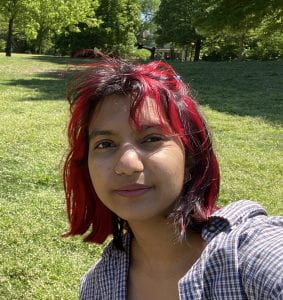
ANY PRONOUNS
Hometown: Mumbai/Ahmedabad
Year: 2023
Major(s): RTVF, English (Creative Writing)
School: School of Communication
Involvement on Campus: Multicultural Filmmakers Collective, Helicon, Northwestern CAGE
Special Interests/Hobbies: Walking, zines, cheese
Research Funding and Programs: Weinberg Summer Baker Grant (2020), Weinberg Academic Year Baker Grant (2020-21), Leopold Fellowship (2021-22), SURG (2022), Franke Undergraduate Fellowship (2022-23), AYURG (2022-23)
Research Experiences: Research Assistant for Prof Lisa Del Torto in Linguistics/Family Writing Program (Baker Grants); Research Assistant for Prof Daniel Immerwahr in History (Leopold); Independent research on madwomen, bad women, and queer women in Indian soap operas to write a TV pilot (SURG), Independent research on the “brown voice” and sonic color line in American film and television post-9/11 to create a short documentary (Franke), Independent research on Indian accents in the call center and alternative post-production methods to create a short narrative film (AYURG)
How did you get interested in research? I’ve been interested in research ever since my freshman year when I was introduced to the Office of Undergraduate Research and learnt how much diverse and interesting work one can undertake at Northwestern, even under the wide umbrella of the humanities and arts. Being a Research Assistant as an underclassmen also really helped contribute to my interest in research and its various applications
How do you approach your role as a peer mentor? What is important to you about being a peer mentor? Mentorship is so so important in research. Without help from my professors and peer mentors, I would never have figured out how to design a research plan or undertake it or how to manage my time. I hope to approach my role as a peer mentor from the perspective of a beginner. I know how daunting it can be to take on an independent project, especially when it is supposed to result in creative output, and I hope I can support my peers in feeling confident and making it through!
Vir (Biological Sciences)
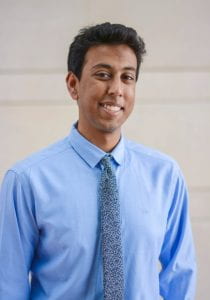
HE/HIM/HIS
Hometown Woodridge, IL
Year: 2024
Major(s): Biological Sciences
Schools: Weinberg College of Arts and Sciences
Involvement on Campus: Wildside, GlobeMed, Purple Preview, Peer-Guided Study Group Leader
Special Interests/Hobbies: Watching Sports, Listening to music/going to concerts, Running
Research Funding and Programs: SURG (2022), Weinberg Baker Grant (2023), BIOL_SCI 399
Research Experiences: My research experience has been entirely through the Pinkett Lab in the Department of Molecular Biosciences at Northwestern. The Pinkett Lab focuses on the study of ABC transporters using a variety of biochemical techniques. Specifically, I study the structure and function of the ABC transporter, ProU. The goal of the project was for another undergraduate and me to purify the three components of ProU(ProX, ProV, and ProW) to determine the structure of the transporter, as well as, its function. My main focus so far has been the stable purification of ProVW and attempts to determine its structure. Since the Winter of 2022, I have been enrolled in BIOL_SCI 399 research for credit in the lab, as well as, doing research over the summer of 2022 through a SURG. For the Summer of 2023, I will continue my research with funding from the Baker Grant.
How did you get interested in research? I had heard a lot about research in interviews, tours, and conversations with peers, but had no idea what research entails. Thus, I wanted to have the opportunity to try my hand at research and see if it was something that I enjoyed.
How do you approach your role as a peer mentor? What is important to you about being a peer mentor? I focus on the fact that I am a PEER mentor. That means that while I have experience doing research that I can share, I do not have all the answers. While my mentees can learn from my success and many “failures”, I can learn from seeing how my mentees learn and adapt to their own research experiences. Being a peer mentor means being a level of support in building my mentees up to be the best version of themselves, but also not losing sight of all I have left to learn.
